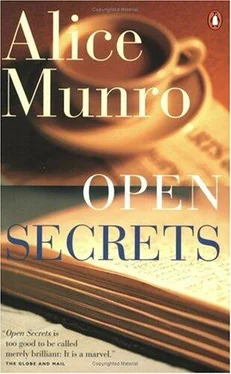“I have a life,” Dorrie said.
“All right then,” said Millicent, as if she had given up arguing. She sat and drank her poisonous tea. She was getting an inspiration. She let time pass and then she said, “It’s up to you, it certainly is. But there is a problem about where you will live. You can’t live here. When Porter and I found out you were getting married, we put this place on the market, and we sold it.”
Dorrie said instantly, “You are lying.”
“We didn’t want it standing empty to make a haven for tramps. We went ahead and sold it.”
“You would never do such a trick on me.”
“What kind of a trick would it be when you were getting married?”
Millicent was already believing what she said. Soon it could come true. They could offer the place at a low enough price, and somebody would buy it. It could still be fixed up. Or it could be torn down, for the bricks and the woodwork. Porter would be glad to be rid of it.
Dorrie said, “You would not put me out of my house.”
Millicent kept quiet.
“You are lying, aren’t you?” said Dorrie.
“Give me your Bible,” Millicent said. “I will swear on it.”
Dorrie actually looked around. She said, “I don’t know where it is.”
“Dorrie, listen. All of this is for your own good. It may seem like I am pushing you out, Dorrie, but all it is is making you do what you are not quite up to doing on your own.”
“Oh,” said Dorrie. “Why?”
Because the wedding cake is made, thought Millicent, and the satin dress is made, and the luncheon has been ordered and the invitations have been sent. All this trouble that has been gone to. People might say that was a silly reason, but those who said that would not be the people who had gone to the trouble. It was not fair to have your best efforts squandered.
But it was more than that, for she believed what she had said, telling Dorrie that this was how she could have a life. And what did Dorrie mean by “here”? If she meant that she would be homesick, let her be! Homesickness was never anything you couldn’t get over. Millicent was not going to pay any attention to that “here.” Nobody had any business living a life out “here” if they had been offered what Dorrie had. It was a kind of sin to refuse such an offer. Out of mulishness, out of fearfulness, and idiocy.
She had begun to get the feeling that Dorrie was cornered. Dorrie might be giving up, or letting the idea of giving up seep through her. Perhaps. She sat as still as a stump, but there was a chance such a stump might be pulpy within.
But it was Millicent who began suddenly to weep. “Oh, Dorrie,” she said. “Don’t be stupid!” They both got up, and grabbed hold of each other, and then Dorrie had to do the comforting, patting and soothing in a magisterial way, while Millicent wept and repeated some words that did not hang together. Happy. Help. Ridiculous .
“I will look after Albert,” she said, when she had calmed down somewhat. “I’ll put flowers. And I won’t mention this to Muriel Snow. Or to Porter. Nobody needs to know.”
Dorrie said nothing. She seemed a little lost, absentminded, as if she was busy turning something over and over, resigning herself to the weight and strangeness of it.
“That tea is awful,” said Millicent. “Can’t we make some that’s fit to drink?” She went to throw the contents of her cup into the slop pail.
There stood Dorrie in the dim window light — mulish, obedient, childish, female — a most mysterious and maddening person whom Millicent seemed now to have conquered, to be sending away. At greater cost to herself, Millicent was thinking — greater cost than she had understood. She tried to engage Dorrie in a sombre but encouraging look, cancelling her fit of tears. She said, “The die is cast.”
Dorrie walked to her wedding.
Nobody had known that she intended to do that. When Porter and Millicent stopped the car in front of her house to pick her up, Millicent was still anxious.
“Honk the horn,” she said. “She better be ready now.”
Porter said, “Isn’t that her down ahead?”
It was. She was wearing a light gray coat of Albert’s over her satin dress, and was carrying her picture hat in one hand, a bunch of lilacs in the other. They stopped the car and she said, “No, I want the exercise. It will clear out my head.”
They had no choice but to drive on and wait at the church and see her approaching down the street, people coming out of shops to look, a few cars honking sportively, people waving and calling out, “Here comes the bride!” As she got closer to the church, she stopped and removed Albert’s coat, and then she was gleaming, miraculous, like the Pillar of Salt in the Bible.
Muriel was inside the church playing the organ, so she did not have to realize, at this last moment, that they had forgotten all about gloves and that Dorrie clutched the woody stems of the lilac in her bare hands. Mr. Speirs had been in the church, too, but he had come out, breaking all rules, leaving the minister to stand there on his own. He was as lean and yellow and wolfish as Millicent remembered, but when he saw Dorrie fling the old coat into the back of Porter’s car, and settle the hat on her head — Millicent had to run up and fix it right — he appeared nobly satisfied. Millicent had a picture of him and Dorrie mounted high, mounted on elephants, panoplied, borne cumbrously forward, adventuring. A vision. She was filled with optimism and relief and she whispered to Dorrie, “He’ll take you everywhere! He’ll make you a Queen!”
“I have grown as fat as the Queen of Tonga,” wrote Dorrie from Australia, some years on. A photograph showed that she was not exaggerating. Her hair was white, her skin brown, as if all her freckles had got loose and run together. She wore a vast garment, colored like tropical flowers. The war had come and put an end to any idea of travelling, and then when it was over, Wilkie was dying. Dorrie stayed on, in Queensland, on a great property where she grew sugarcane and pineapples, cotton, peanuts, tobacco. She rode horses, in spite of her size, and had learned to fly an airplane. She took up some travels of her own in that part of the world. She had shot crocodiles. She died in the fifties, in New Zealand, climbing up to look at a volcano.
Millicent told everybody what she had said she would not mention. She took credit, naturally. She recalled her inspiration, her stratagem, with no apologies. “Somebody had to take the bull by the horns,” she said. She felt that she was the creator of a life — more effectively, in Dorrie’s case, than in the case of her own children. She had created happiness, or something close. She forgot the way she had wept, not knowing why.
The wedding had its effect on Muriel. She handed in her resignation, she went off to Alberta. “I’ll give it a year,” she said. And within a year she had found a husband — not the sort of man she had ever had anything to do with in the past. A widower with two small children. A Christian minister. Millicent wondered at Muriel’s describing him that way. Weren’t all ministers Christian? When they came back for a visit — by this time there were two more children, their own — she saw the point of the description. Smoking and drinking and swearing were out, and so was wearing makeup, and the kind of music that Muriel used to play. She played hymns now, of the sort she had once made fun of. She wore any color at all and had a bad permanent — her hair, going gray, stood up from her forehead in frizzy bunches. “A lot of my former life turns my stomach just to think about it,” she said, and Millicent got the impression that she and Porter were seen mostly as belonging to those stomach-turning times.
Читать дальше












